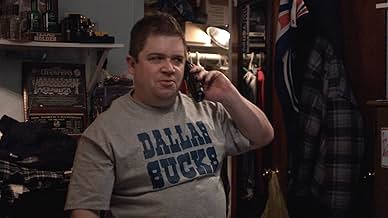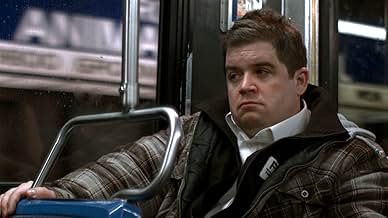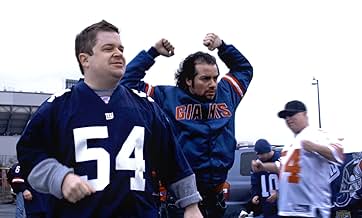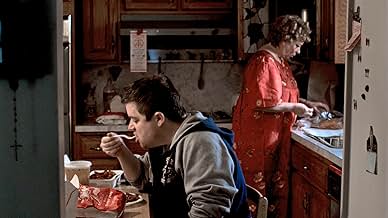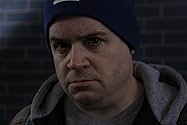VALUTAZIONE IMDb
6,6/10
10.102
LA TUA VALUTAZIONE
Aggiungi una trama nella tua linguaA hard-core New York Giants fan struggles to deal with the consequences when he is beaten up by his favorite player.A hard-core New York Giants fan struggles to deal with the consequences when he is beaten up by his favorite player.A hard-core New York Giants fan struggles to deal with the consequences when he is beaten up by his favorite player.
- Premi
- 1 vittoria e 5 candidature totali
Sidné Anderson
- Hospital Doctor
- (as Sidne Anderson)
Recensioni in evidenza
Oswalt plays a guy you might call a loser, but his character wouldn't agree. He's not as over-the-top into loserdom as DiNiro in "King of Comedy." He's not delusional, in other words, just passionate. His team means more than anything to him, and if they are doing OK, he is content. In his world, he has status, and he's just not interested in anything outside that world.
I was surprised to see real acting going on, not comedy. (I won't say "just" comedy - that's hard as hell and takes real talent.) Nothing milked for laughs, nothing that broke the boundaries of the world of the story. A reviewer said Oswalt was "fearless", and I agree. William Goldman wrote of stars that you can never make their parts cool enough for them. That's why so many movies are so terrible. Oswalt has never seemed that interested in being cool. Instead, he dives into his character, as sympathetic or unsympathetic as the moment requires. Not a shtick: character.
It is a low budget production, but I felt it was adequate. The production values didn't hurt. And it is funny, just not 3 jokes / page of script.
I was surprised to see real acting going on, not comedy. (I won't say "just" comedy - that's hard as hell and takes real talent.) Nothing milked for laughs, nothing that broke the boundaries of the world of the story. A reviewer said Oswalt was "fearless", and I agree. William Goldman wrote of stars that you can never make their parts cool enough for them. That's why so many movies are so terrible. Oswalt has never seemed that interested in being cool. Instead, he dives into his character, as sympathetic or unsympathetic as the moment requires. Not a shtick: character.
It is a low budget production, but I felt it was adequate. The production values didn't hurt. And it is funny, just not 3 jokes / page of script.
"Big Fan" is an unpleasant movie about an extremely unpleasant man.
Patton Oswalt plays a dumpy 37-year-old loser who lives with his mother and spends his life living vicariously through the glories of the New York Giants. On a night out on the town, he and his buddy catch sight of their favorite player and follow him to a nightclub. When they approach him, a misunderstanding leads to Oswalt getting badly beaten by him. But he refuses to take legal action against him despite the admonishments of his family, because he'd rather see his favorite player able to lead his team to a win than seek remuneration for himself.
"Big Fan" starts out as a low-key comedy, but gradually picks up dark overtones and seems like it's going to take its audience to some uncomfortable places. Oswalt's character comes across as a schlubby but mostly decent guy at first, but as the movie progresses, we start to wonder if he might be mentally unhinged. However, a cop-out ending lurches the film back into uneasy dark comedy, and basically asks us to find Oswalt's character endearing even though he's been nothing but off putting.
The tone is all over the place, the comedy never really working. If the film had acknowledged that Oswalt's character is a loser, and made some kind of point about the fine line that begins to separate hobby from obsession, it might have been more interesting. But it instead asks us to take his side, and seems to take the stance that his obsession is just the healthy interest of your everyday man-child. The movie goes out of its way to make Oswalt's family into obnoxious caricatures, and we're not supposed to like them because they think he needs to get a life, but guess what....his family seemed to me to make a lot of sense.
Pretty much the definition of a misfire.
Grade: C
Patton Oswalt plays a dumpy 37-year-old loser who lives with his mother and spends his life living vicariously through the glories of the New York Giants. On a night out on the town, he and his buddy catch sight of their favorite player and follow him to a nightclub. When they approach him, a misunderstanding leads to Oswalt getting badly beaten by him. But he refuses to take legal action against him despite the admonishments of his family, because he'd rather see his favorite player able to lead his team to a win than seek remuneration for himself.
"Big Fan" starts out as a low-key comedy, but gradually picks up dark overtones and seems like it's going to take its audience to some uncomfortable places. Oswalt's character comes across as a schlubby but mostly decent guy at first, but as the movie progresses, we start to wonder if he might be mentally unhinged. However, a cop-out ending lurches the film back into uneasy dark comedy, and basically asks us to find Oswalt's character endearing even though he's been nothing but off putting.
The tone is all over the place, the comedy never really working. If the film had acknowledged that Oswalt's character is a loser, and made some kind of point about the fine line that begins to separate hobby from obsession, it might have been more interesting. But it instead asks us to take his side, and seems to take the stance that his obsession is just the healthy interest of your everyday man-child. The movie goes out of its way to make Oswalt's family into obnoxious caricatures, and we're not supposed to like them because they think he needs to get a life, but guess what....his family seemed to me to make a lot of sense.
Pretty much the definition of a misfire.
Grade: C
I never knew this movie existed until Howard Stern mentioned it on his show last week. I'm glad he did because this was a good movie. Patton Oswalt is once again type-cast as the geeky guy who lives with his mom except this time he's a huge football fan. Michael Rappaport basically just plays himself, a mean spirited jerk, and Kevin Corrigan is once again type-cast as the barely noticeable, somewhat supportive best friend. Despite the three main actors not stretching at all for this movie, it still works somehow. Though I must say that Satan from Your Pretty Face Is Going To Hell was disappointing as the police detective. This is definitely a movie you should see.
Paul is in his mid-thirties, single, and still living at home with his mother. He works as a parking lot attendant in New York, and is content to sit in his booth at night writing down passionate, articulate rants, so that when he goes home he can call a local radio sports show and prove his fanaticism for the Giants, his favorite football team.
Paul is played by Patton Oswalt, one of the funniest stand-up comedians alive, and what he does in this film is really quite remarkable. He creates a fully convincing and pathetic loser, and is unafraid to reveal all the character's lowest points. If this were an Adam Sandler comedy we'd probably have scenes showing us how misunderstood and sweet Paul is, so we can understand that he's the one we're meant to root for, but Oswalt's Paul isn't so cleancut. He treats his family like crap and has terrible mood swings; he only seems truly happy when he's in his element: either witnessing a Giants win or ranting to strangers on the radio. The fact that he must write his speeches down beforehand, and preps himself for hours in advance of calling, says everything.
Paul gets in trouble when he spots a Giants quarterback at a gas station in a shady neighborhood and follows him into a NYC nightclub. After an awkward introduction, Paul makes the mistake of mentioning that he's been following the sports star and his entourage for the past few hours, and the drunken athlete reacts by beating him senseless. Three days later Paul is hospitalized and the police want his statement -- but he suddenly "can't remember" anything that happened, desperately hoping the Giants won't be forced to suspend their star athlete. But that's just the beginning of his problems.
Big Fan is the directorial debut of Robert D. Siegel, who wrote last year's sports-themed The Wrestler. Both movies concern the plights of apparent losers, the biggest difference being Mickey Rourke's 'Ram' actually had a life at one point, whereas Paul's existence is experienced vicariously. Everyone around him tries to offer a better life, whether it's jobs or moving into his own place, but he firmly rejects them. In Paul's eyes, this is his life. He is perfectly content to be discontent, and the movie's lack of transformation for its character will undoubtedly alienate some viewers.
And, put bluntly, Big Fan is not as strong or poignant as The Wrestler. Siegel is not as capable a director as Darren Aronofsky, and the story -- despite clocking in at under an hour and a half -- does tend to meander a few times. But it is endearingly bleak, honest and real, and kept afloat by Oswalt's fascinating performance, which is hard to shake off even after the credits are over.
Paul is played by Patton Oswalt, one of the funniest stand-up comedians alive, and what he does in this film is really quite remarkable. He creates a fully convincing and pathetic loser, and is unafraid to reveal all the character's lowest points. If this were an Adam Sandler comedy we'd probably have scenes showing us how misunderstood and sweet Paul is, so we can understand that he's the one we're meant to root for, but Oswalt's Paul isn't so cleancut. He treats his family like crap and has terrible mood swings; he only seems truly happy when he's in his element: either witnessing a Giants win or ranting to strangers on the radio. The fact that he must write his speeches down beforehand, and preps himself for hours in advance of calling, says everything.
Paul gets in trouble when he spots a Giants quarterback at a gas station in a shady neighborhood and follows him into a NYC nightclub. After an awkward introduction, Paul makes the mistake of mentioning that he's been following the sports star and his entourage for the past few hours, and the drunken athlete reacts by beating him senseless. Three days later Paul is hospitalized and the police want his statement -- but he suddenly "can't remember" anything that happened, desperately hoping the Giants won't be forced to suspend their star athlete. But that's just the beginning of his problems.
Big Fan is the directorial debut of Robert D. Siegel, who wrote last year's sports-themed The Wrestler. Both movies concern the plights of apparent losers, the biggest difference being Mickey Rourke's 'Ram' actually had a life at one point, whereas Paul's existence is experienced vicariously. Everyone around him tries to offer a better life, whether it's jobs or moving into his own place, but he firmly rejects them. In Paul's eyes, this is his life. He is perfectly content to be discontent, and the movie's lack of transformation for its character will undoubtedly alienate some viewers.
And, put bluntly, Big Fan is not as strong or poignant as The Wrestler. Siegel is not as capable a director as Darren Aronofsky, and the story -- despite clocking in at under an hour and a half -- does tend to meander a few times. But it is endearingly bleak, honest and real, and kept afloat by Oswalt's fascinating performance, which is hard to shake off even after the credits are over.
Patton Oswalt plays Paul Aufiero, the star of Big Fan, an indie drama about a New York Giants football fanatic. He eats and breaths blue and red and wants nothing more than for his team to go all the way. He works as a parking garage attendant where he takes money, opens the gate, and prepares his thoughts for the night's radio broadcast where he is Paul from Staten Island. He calls to give his opinion about the team, how they will win, and tells another fellow caller, Philadelphia Phil, a proud Eagles fan, that he can basically go eat his own shorts.
He lives at home with his mother where he is bombarded with ideas and images of a better life thanks to his well of brother (Gino Cafarelli), a lawyer, and his brother-in-law who keeps after Paul with a job offer that he doesn't want. Paul's only haven is with his best and only friend Sal (Kevin Corrigan). They share a love for the game and a love for their team. One night they spot Quantrell Bishop, Paul's favorite Giant. His idol of the gridiron. They see him coming out of a shady spot on Staten Island and decide to follow him all the way into a Manhattan night club. When they decide to approach they are met by a hostile Bishop who thinks they are stalkers. He beats Paul into the hospital where he is met by a barrage of questions from investigators and his lawyer brother. Now he is faced with the decision of turning a blind eye to what happened or pressing charges against his favorite player, likely causing his team a division title.
A round of applause to Oswalt for his performance. He really captured the spirit of his character. I am sure that there are many people out there similar to him (I can think of a few I know who border on this line of fan-hood). Oswalt is a stand-up comedian by trade, but lately has been dabbling with some acting roles. He was the voice of Remy in Pixar's Ratatouille, one of their better casting jobs, and I particularly liked his cameo on Comedy Central's "Reno 911" where he played a "gamer" like those from "World of Warcraft" and "Dungeon's and Dragons". Here he steps way out of his comfort zone and does so effortlessly.
This is a Robert D. Siegel's directorial debut. After writing the screenplay for last year's The Wrestler, he dives into a different sport: the sport of, well, watching sports. He presents us with another tragic character. Paul is someone who cares only for his team. Not himself, his family, or his future. He doesn't care for his job and he doesn't care about how he lives. He is a special kind of man.
Siegel does a nice job behind the camera, but his strength is clearly on paper. He does a great job establishing background for his characters. We know that Paul has been a die hard sports fan for a long time. We know that he has worked the same job and has lived the same routine for years and years. Little things like his mother saving Chinese food condiments and the cluttering of Paul's bedroom walls with sports paraphernalia give these characters a history. One that we can relate to and have seen before.
This is a nice little film that has an excellent story with an even better ending. I really enjoyed the struggle that Paul goes through with all of the different pressures around him, trying to persuade him to go against his will. An excellent achievement for both Siegler and Oswalt.
He lives at home with his mother where he is bombarded with ideas and images of a better life thanks to his well of brother (Gino Cafarelli), a lawyer, and his brother-in-law who keeps after Paul with a job offer that he doesn't want. Paul's only haven is with his best and only friend Sal (Kevin Corrigan). They share a love for the game and a love for their team. One night they spot Quantrell Bishop, Paul's favorite Giant. His idol of the gridiron. They see him coming out of a shady spot on Staten Island and decide to follow him all the way into a Manhattan night club. When they decide to approach they are met by a hostile Bishop who thinks they are stalkers. He beats Paul into the hospital where he is met by a barrage of questions from investigators and his lawyer brother. Now he is faced with the decision of turning a blind eye to what happened or pressing charges against his favorite player, likely causing his team a division title.
A round of applause to Oswalt for his performance. He really captured the spirit of his character. I am sure that there are many people out there similar to him (I can think of a few I know who border on this line of fan-hood). Oswalt is a stand-up comedian by trade, but lately has been dabbling with some acting roles. He was the voice of Remy in Pixar's Ratatouille, one of their better casting jobs, and I particularly liked his cameo on Comedy Central's "Reno 911" where he played a "gamer" like those from "World of Warcraft" and "Dungeon's and Dragons". Here he steps way out of his comfort zone and does so effortlessly.
This is a Robert D. Siegel's directorial debut. After writing the screenplay for last year's The Wrestler, he dives into a different sport: the sport of, well, watching sports. He presents us with another tragic character. Paul is someone who cares only for his team. Not himself, his family, or his future. He doesn't care for his job and he doesn't care about how he lives. He is a special kind of man.
Siegel does a nice job behind the camera, but his strength is clearly on paper. He does a great job establishing background for his characters. We know that Paul has been a die hard sports fan for a long time. We know that he has worked the same job and has lived the same routine for years and years. Little things like his mother saving Chinese food condiments and the cluttering of Paul's bedroom walls with sports paraphernalia give these characters a history. One that we can relate to and have seen before.
This is a nice little film that has an excellent story with an even better ending. I really enjoyed the struggle that Paul goes through with all of the different pressures around him, trying to persuade him to go against his will. An excellent achievement for both Siegler and Oswalt.
Lo sapevi?
- QuizDirector Robert Siegel has said that between takes in the strip club, while other members of cast and crew were enjoying the company of dancers, actor Patton Oswalt was watching episodes of John Adams (2008) on his iPod in a private room.
- BlooperWhen Paul is reading the newspaper about the Giants' actions regarding the suspended player, two short paragraphs are repeated several times to give the appearance of more news copy.
- Citazioni
Paul Aufiero: He was rusty.
- Colonne sonoreOoh Poo Pah Doo
Written by Jessie Hill
Performed by Mitch Ryder & The Detroit Wheels
Courtesy of Rhino Entertainment Company
By Arrangement with Warner Music Group Film & TV Licensing
I più visti
Accedi per valutare e creare un elenco di titoli salvati per ottenere consigli personalizzati
- How long is Big Fan?Powered by Alexa
Dettagli
- Data di uscita
- Paese di origine
- Sito ufficiale
- Lingua
- Celebre anche come
- Paul Aufiero
- Luoghi delle riprese
- Aziende produttrici
- Vedi altri crediti dell’azienda su IMDbPro
Botteghino
- Lordo Stati Uniti e Canada
- 234.540 USD
- Fine settimana di apertura Stati Uniti e Canada
- 24.266 USD
- 30 ago 2009
- Lordo in tutto il mondo
- 234.540 USD
- Tempo di esecuzione
- 1h 28min(88 min)
- Mix di suoni
- Proporzioni
- 1.85 : 1
Contribuisci a questa pagina
Suggerisci una modifica o aggiungi i contenuti mancanti


